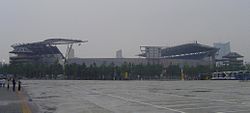| Beijing Marathon | |
|---|---|
 The National Olympic Sports Centre is the race finishing point | |
| Date | February |
| Location | Beijing, China |
| Race type | road |
| Distance | Marathon |
| Established | 1981 |
| Official site | Beijing International Marathon |
Beijing International Marathon
The Beijing International Marathon (Chinese: 北京国际马拉松赛) is an annual marathon race of 42.195 km held in October in Beijing, People's Republic of China. The race was first held in 1981 and has been held every year since. The race begins at Tienanmen Square and finishes at the National Olympic Sports Centre stadium. In addition to the main marathon, there is a 10km run, a mini-marathon and a half marathon. At the 2009 edition of the race, 4897 runners finished the marathon course, which included 556 women.
The race holds an IAAF Gold Label Road Race, one of two marathons in the People's Republic of China to receive the distinction (along with the Xiamen International Marathon). It is AIMS-certified course, making it eligible for world record performances,.
History of Beijing Marathon,
The Beijing International Marathon has been organized by the Chinese Athletics Association annually since 1981. In 1986 Taisuke Kodama of Japan set the course record in a time of 2:07:35.
In 1988 this time was equaled by Abebe Mekonnen of Ethiopia. In 2003, Sun Yingjie of China set the current women's record of 2:19:38 – this run was an Asian record and the fourth fastest ever at the time, and it remains the Chinese record for the event. The 2005 race served as the marathon for the 2005 National Games of the People's Republic of China – Sun Yingjie took the Games gold medal for women while seventh placed Zhang Qingle (18 years old at the time) was the highest placing Chinese man and won the men's Games gold.
Chinese runner Bai Xue has won the race twice consecutively
Also in 2005, the men's race winner Benson Kipchumba Cherono missed some 800 metres out of the course due to being misdirected. The race organisers accepted the blame for the mishap and, although James Moiben was the first to finish the complete course (2:12:15), Cherono was declared the official winner as he held a large leading margin before the incident.
Year | Men's Winner | Time (h:m:s) | Women's Winner | Time (h:m:s) |
|---|---|---|---|---|
| 2009 | 2:08:20 | 2:34:44 | ||
| 2008 | 2:10:14 | 2:26:27 | ||
| 2007 | 2:08:09 | 2:27:05 | ||
| 2006 | 2:10:36 | 2:34:41 | ||
| 2005 | 2:06:55[6] | 2:21:01 | ||
| 2004 | 2:10:42 | 2:24:11 | ||
| 2003 | 2:07:49 | 2:19:39 | ||
| 2002 | 2:13:09 | 2:21:21 | ||
| 2001 | 2:10:11 | 2:23:37 | ||
| 2000 | 2:13:52 | 2:26:34 | ||
| 1999 | 2:11:33 | 2:29:20 | ||
| 1998 | 2:13:49 | 2:28:50 | ||
| 1997 | 2:09:18 | 2:26:39 | ||
| 1996 | 2:10:37 | 2:27:13 | ||
| 1995 | 2:16:20 | 2:30:00 | ||
| 1994 | 2:10:56 | 2:31:11 | ||
| 1993 | 2:10:27 | 2:30:36 | ||
| 1992 | 2:11:29 | 2:28:53 | ||
| 1991 | 2:12:55 | 2:35:18 | ||
| 1990 | 2:14:55 | 2:32:14 | ||
| 1989 | 2:12:47 | 2:27:16 | ||
| 1988 | 2:07:35 | |||
| 1987 | 2:12:19 | |||
| 1986 | 2:07:35 | |||
| 1985 | 2:10:23 | |||
| 1984 | 2:12:16 | - | ||
| 1983 | 2:18:51 | |||
| 1982 | 2:14:44 | |||
| 1981 | 2:15:20 |
(source:wikipedia)


No comments:
Post a Comment